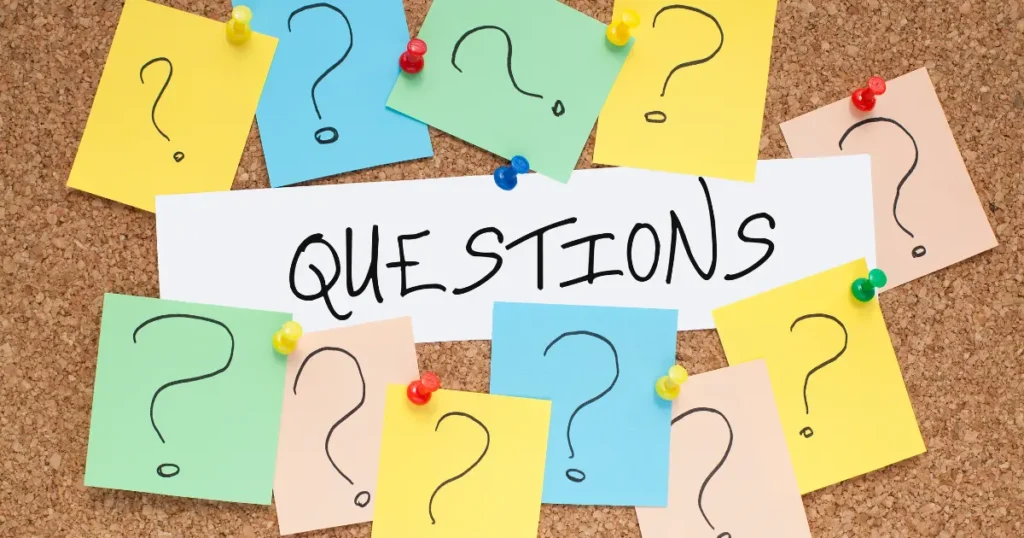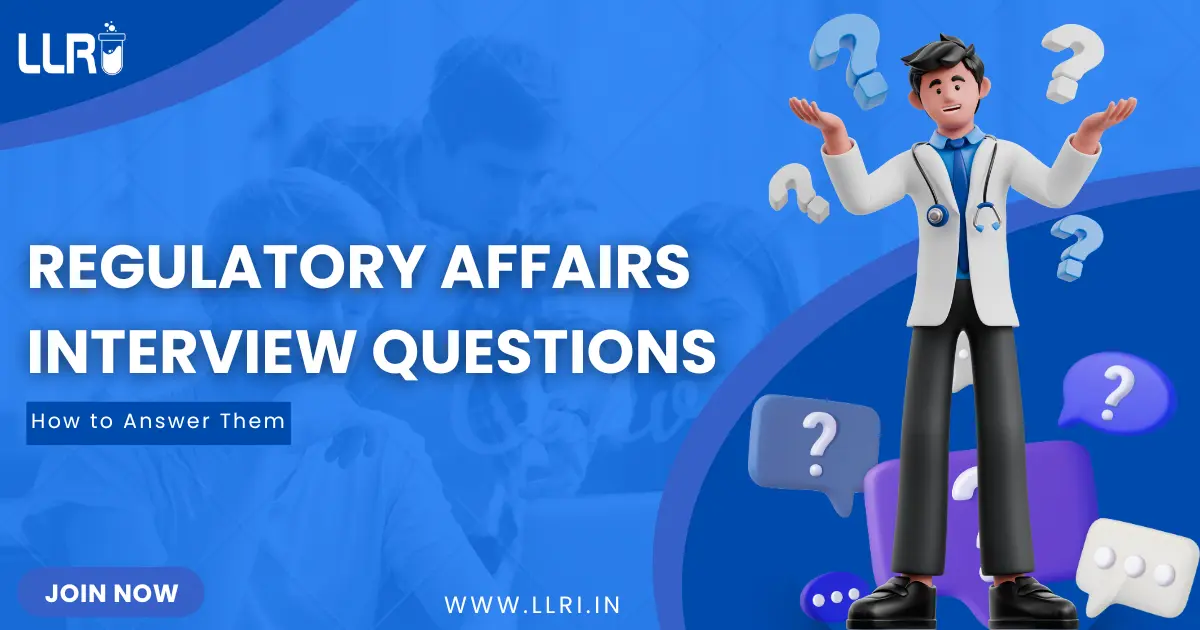Regulatory Affairs Interview Questions: So, you’re eyeing a role in regulatory affairs and want to be fully prepared for interview day? Great move. The field is growing constantly, especially in India, where pharma exports and clinical trials are in more focus – But with demand comes competition!
Whether you’re fresh out of a Clinical Research Course or climbing up to a Regulatory Affairs Manager role, this blog by LLRI will equip you with the most asked regulatory affairs interview questions, and how to answer them like a pro.
Table of Contents
Why Regulatory Affairs?
Regulatory affairs professionals act as a bridge between the company and regulatory authorities. That means you’re the one who ensures that the drug development and approval process is smooth, ethical, and follows every guideline, whether it’s DCGI in India, US FDA, or EMA in Europe.
Common Regulatory Affairs Interview Questions (With Sample Answers)
Here’s a solid list of regulatory affairs interview questions you can expect, along with some smart answers:
1. What is the role of a regulatory affairs department in a pharmaceutical company?
Why they ask: To check your basic understanding of the department.
Sample Answer:
“The regulatory affairs department ensures that products comply with all regulations and standards before they are released into the market. It also handles the submission of necessary documents to authorities like the CDSCO in India, and ensures the product meets safety, efficacy, and quality benchmarks.”
Always include the name of Indian authorities (DCGI/CDSCO) if you’re applying in India.
2. Can you explain the process of filing a dossier?
Why they ask: To check your hands-on experience.
Sample Answer:
“Yes. A dossier includes all technical and clinical data for a drug, formatted as per CTD or ACTD guidelines. It includes modules like administrative data, quality documentation, non-clinical, and clinical study reports. In India, we submit dossiers to CDSCO.”
3. What is the difference between ANDA and NDA?
Why they ask: A classic from the pharma regulatory affairs interview questions and answers set.
Sample Answer:
“NDA (New Drug Application) is submitted for a completely new drug to prove its safety and efficacy. ANDA (Abbreviated New Drug Application) is used for generics, proving bioequivalence to an existing drug.”

4. How do you handle regulatory changes mid-project?
Why they ask: To test your problem-solving and adaptability.
Sample Answer:
“I stay updated with global regulatory databases. If there’s a change mid-project, I immediately assess its impact and work with cross-functional teams to revise submissions accordingly.”
5. What is the importance of pharmacovigilance in regulatory submissions?
Why they ask: Especially relevant in interview questions on regulatory affairs involving post-marketing responsibilities.
Sample Answer:
“Pharmacovigilance ensures that adverse events are tracked and addressed. It’s crucial in both pre- and post-marketing submissions and helps maintain the safety profile of a drug.”
Here’s an extra read for you: How To Become A Regulatory Affairs Professional? Is Regulatory Affairs Career Change Easy?
Role-Specific Regulatory Affairs Interview Questions
Depending on the job role, the type of questions will shift slightly. Here’s how:
For Executive Roles
Interview questions for regulatory affairs executive:
- How do you manage document control in regulatory submissions?
- What tools have you used for tracking submission timelines?
- Have you worked on eCTD submissions?
For Specialists
Regulatory affairs specialist interview questions:
- How do you keep yourself updated with new regulatory guidelines?
- Have you ever handled regulatory inspections?
- What is your role in preparing variation filings?
For Managers
Interview questions for regulatory affairs manager:
- How do you manage a team under submission pressure?
- What’s your strategy for regulatory risk management?
- Can you describe a situation where your regulatory input changed a key business decision?
That’s not all!
Here’s a rich list of regulatory affairs interview questions, grouped by type and job role. These questions are tailored for pharma professionals and those preparing through a Clinical Research Institute like Learning Labb Research Institute (LLRI).
General Regulatory Affairs Interview Questions
These apply to most roles in regulatory affairs, especially freshers or entry-level candidates.
- What is the role of a regulatory affairs department in a pharma company?
- What are ICH guidelines? Can you name a few?
- What is CTD and ACTD format?
- What is the difference between an NDA and ANDA?
- What documents are required for a product registration in India?
- What is the significance of Good Manufacturing Practice (GMP) in regulatory affairs?
- How do you stay updated with regulatory changes and updates?
- What is a regulatory submission? What types are there?
- Can you explain the lifecycle of a drug from discovery to market?
- What is the role of regulatory affairs in clinical trials?

Pharma Regulatory Affairs Interview Questions and Answers
These are highly relevant for candidates interviewing in pharma companies or CROs.
- What is bioequivalence and how does it relate to ANDA filings?
- What is a variation filing?
- How is a generic drug approved in India?
- What are the responsibilities of regulatory affairs in a pharma manufacturing unit?
- What are the key regulatory bodies globally? (e.g., DCGI, USFDA, EMA)
- Can you differentiate between Module 1 and Module 3 of the CTD?
- What is the format for eCTD submissions?
- How are labels and packaging managed under regulatory compliance?
- Explain the term pharmacovigilance and its importance in RA.
- What is the difference between Schedule Y and ICH GCP?
Interview Questions for Regulatory Affairs Executive
These are perfect if you’re targeting an executive or junior-level role.
- Have you handled document compilation and review for submission?
- How do you manage submission deadlines?
- Which software tools have you used for regulatory documentation?
- What challenges have you faced in coordinating between RA and QA?
- How would you handle a missing document in a submission file?
- Have you worked on any variation or renewal submissions?
- What are common errors to avoid during regulatory filings?
- How do you track changes in regulatory guidelines?
Regulatory Affairs Specialist Interview Questions
As a specialist, you’re expected to handle more complex and market-specific tasks.
- How do you manage submissions across multiple global regions?
- Describe your experience with eCTD publishing tools.
- Have you worked on USFDA or EMA submissions?
- What’s your role in preparing a regulatory strategy?
- How do you evaluate risk from a regulatory standpoint?
- Describe your experience with product lifecycle management.
- What are your steps to ensure submission completeness?
- Have you handled regulatory audits or inspections?
Interview Questions for Regulatory Affairs Manager
For senior professionals and managers, strategic and leadership questions are common.
- How do you prioritize regulatory projects with conflicting deadlines?
- Have you led a regulatory team before? How do you delegate tasks?
- Describe a situation where you avoided a potential regulatory delay.
- What’s your strategy for regulatory compliance during a product launch?
- How do you manage stakeholder expectations during submission delays?
- What’s your approach to cross-functional collaboration (e.g., QA, R&D)?
- How do you assess market-specific regulatory requirements?
- How do you train new hires in regulatory documentation processes?
Interview Questions on Regulatory Affairs in Clinical Trials
For those shifting from clinical research to RA or working in clinical trial documentation.
- What is your understanding of clinical trial applications (CTAs)?
- What regulatory documentation is required to initiate a trial in India?
- Explain the concept of informed consent from a regulatory perspective.
- What are annual safety reports (ASRs) and development safety update reports (DSURs)?
- How do you handle protocol amendments from a regulatory angle?
- How does regulatory affairs interact with clinical research teams?
- What are the ethical guidelines laid out by ICMR and Schedule Y?
Bonus Questions: Personal and Behavioural
- Why did you choose regulatory affairs as a career?
- How do you handle pressure and short submission timelines?
- What are your long-term goals in regulatory affairs?
- What are your strengths and weaknesses in a documentation-heavy role?

Training from Learning Labb Research Institute (LLRI): How Can It Help You?
If you’re serious about cracking these interviews, consider enrolling in a course at LLRI, known as one of the Best Institutes for PG Diploma in Clinical Research.
They offer:
- Hands-on training on eCTD tools
- Case studies for mock regulatory submissions
- Support for Clinical Research Course Fees with flexible payment options
- Weekend and online batches
- 1:1 mentorship for interview preparation
Their Clinical Research Training Centre model focuses not only on content but how to communicate your knowledge in interviews.
And yes, if you’re concerned about Clinical Research Course Fees, LLRI has flexible EMI plans and weekend batches for working professionals.
Top 10 Interview Preparation Tips for Regulatory Affairs
Here’s what you need to keep in mind before stepping into that interview room:
- Know the basics: Brush up on ICH guidelines, CTD structure, and local regulatory bodies.
- Research the company: Know their product lines and submission markets.
- Use keywords: Drop terms like “eCTD”, “variation”, “ANDA”, “NDA” to sound fluent.
- Practice role-specific questions: Refer to the role you’re applying for.
- Don’t ramble: Keep your answers short and impactful.
- Prepare scenarios: Think of real situations from your internships or work.
- Dress neatly: First impressions still count.
- Bring supporting documents: Certificates, resumes, training completion letters.
- Mention training: Especially if you’ve done it at a reputed Clinical Research Training Center.
- Ask questions: In the end, ask about your responsibilities, team size, or the company’s expansion plans.
On A Final Note…
There’s no doubt that regulatory affairs interview questions can be tricky, but they’re totally beatable with the right prep. Whether you’re applying for an executive, specialist, or manager position, getting familiar with these pharma regulatory affairs interview questions and answers will give you a sharp edge.
And if you’re still in the learning phase, don’t wait. Enrol in a reputed Clinical Research Institute like LLRI, where they not only offer classroom training but also guide you with real-world case studies.
Remember: The job doesn’t go to the best candidate. It goes to the best-prepared one.
FAQs
Which is the best institute for PG Diploma in Clinical Research in India?
Learning Labb Research Institute (LLRI) is considered one of the best due to its real-time projects, experienced faculty, and placement support.
What’s the average clinical research course fees in India?
It ranges from ₹50,000 to ₹1.5 lakhs depending on the duration, modules, and placement guarantees.
How do clinical research courses help in regulatory affairs?
They build a strong foundation in drug development, GCP guidelines, and documentation, which are crucial for any regulatory role.
Are online clinical research courses worth it?
If taken from reputed institutes like LLRI, they offer industry-relevant content, live sessions, and practical exposure.
What are the chances of getting placed after a clinical research course?
With hands-on training and placement support, many students land jobs in CROs, pharma companies, and hospitals within 3–6 months.

